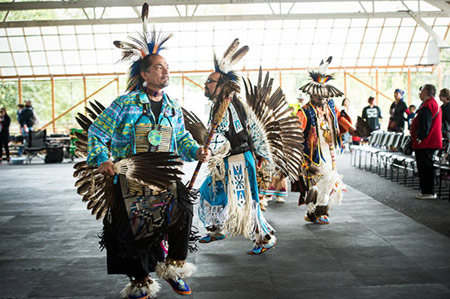By Steve Elder | CNA Media Team

What would have been the 11th Neerchokikoo Powwow has become another casualty of the pandemic.
However, stay tuned for evolving news from the Native American Youth and Family Center (NAYA). According to the nonprofit’s NAYA eNews, staff members are making plans for virtual cultural nights and other programming to keep the community connected to culture and each other. Find details as they become available at NAYApdx.org/events.
Canceling the September in-person event didn’t come easily. Since 2010, the powwow has been a celebration of Native American history and culture through food, music and dance. Men and women of all ages sing and dance throughout the day in their own styles.
The Neerchokikoo Powwow has always been free to the public. In addition to dance exhibitions, native artists offer beautiful prints, jewelry and other items for sale.
It is named for the Chinook village that previously occupied the home of NAYA.
One event NAYA doesn’t plan to cancel is the 17th Annual Gala & Auction. Scheduled for Nov. 13, it’s still on the NAYA calendar – but it is going virtual.
Plans call for Native American art, special performances and inspiring stories. To participate as an artist or sponsor – or to join the event online – keep an eye on https://Gala.NAYApdx.org.
Portland is the home to the ninth largest urban Native American population in the United States, representing members of 380 different tribes.
NAYA works to enrich the lives of native youth and families through education, community involvement and culturally-specific programming It has provided educational services, cultural arts programming and direct support to reduce poverty to the Portland metropolitan area’s native population for over 30 years.
The family center serves self-identified Native American youths and their families throughout the Portland metropolitan area.
NAYA’s powwow isn’t the only one canceled due to the pandemic. The Gathering of Nations, the country’s largest powwow, typically draws some 75,000 Native Americans and non-native people to Albuquerque, New Mexico, to watch 3,000 participants who represent over 750 tribes from the United States and Canada.
The term powwow is traditional, according to “Your Guide to Understanding and Enjoying Powwows.” Author Murton McCluskey wrote, “Some reports say that the word powwow has the origin from the Pawnee word, pa-wa, meaning ‘to eat.’”
“Other sources say the word is of Algonquin origin and was originally pronounced ‘pauau,’ which indicates a gathering of people for the purpose of celebration of an important event. In any case it is a special time to gather and celebrate, meet old friends and create new friendships.”
Steve Elder, East2@ ConcordiaPDX.org, is an inactive lawyer, a developer, activist and old grouch